- Home
- James Herriot
All Things Bright and Beautiful Page 2
All Things Bright and Beautiful Read online
Page 2
I glanced at the luminous dial of the alarm clock. It was three o’clock and as the warmth flowed over me and I drifted away, my mind went back to the ewe and lambs, snug in their scented barn. They would be asleep now, I would soon be asleep, everybody would be asleep.
Except, that is, Harold Ingledew’s neighbours. They still had an hour to go.
2
I HAD ONLY TO sit up in bed to look right across Darrowby to the hills beyond.
I got up and walked to the window. It was going to be a fine morning and the early sun glanced over the weathered reds and greys of the jumbled roofs, some of them sagging under their burden of ancient tiles, and brightened the tufts of green where trees pushed upwards from the gardens among the bristle of chimney pots. And behind everything the calm bulk of the fells.
It was my good fortune that this was the first thing I saw every morning; after Helen, of course, which was better still.
Following our unorthodox tuberculin testing honeymoon we had set up our first home on the top of Skeldale House. Siegfried, my boss up to my wedding and now my partner, had offered us free use of these empty rooms on the third storey and we had gratefully accepted; and though it was a makeshift arrangement there was an airy charm, an exhilaration in our high perch that many would have envied.
It was makeshift because everything at that time had a temporary complexion and we had no idea how long we would be there. Siegfried and I had both volunteered for the R.A.F. and were on deferred service but that is all I am going to say about the war. This book is not about such things which in any case were so very far from Darrowby; it is the story of the months I had with Helen between our marriage and my call-up and is about the ordinary things which have always made up our lives; my work, the animals, the Dales.
This front room was our bed-sitter and though it was not luxuriously furnished it did have an excellent bed, a carpet, a handsome side table which had belonged to Helen’s mother and two armchairs. It had an ancient wardrobe, too, but the lock didn’t work and the only way we kept the door closed was by jamming one of my socks in it. The toe always dangled outside but it never seemed of any importance.
I went out and across a few feet of landing to our kitchen-dining room at the back. This apartment was definitely spartan. I clumped over bare boards to a bench we had rigged against the wall by the window. This held a gas ring and our crockery and cutlery. I seized a tall jug and began my long descent to the main kitchen downstairs because one minor snag was that there was no water at the top of the house. Down two flights to the three rooms on the first storey then down two more and a final gallop along the passage to the big stone-flagged kitchen at the end.
I filled the jug and returned to our eyrie two steps at a time. I wouldn’t like to do this now whenever I needed water but at that time I didn’t find it the least inconvenience.
Helen soon had the kettle boiling and we drank our first cup of tea by the window looking down on the long garden. From up here we had an aerial view of the unkempt lawns, the fruit trees, the wisteria climbing the weathered brick towards our window, and the high walls with their old stone copings stretching away to the cobbled yard under the elms. Every day I went up and down that path to the garage in the yard but it looked so different from above.
“Wait a minute, Helen,” I said. “Let me sit on that chair.”
She had laid the breakfast on the bench where we ate and this was where the difficulty arose. Because it was a tall bench and our recently acquired high stool fitted it but our chair didn’t.
“No, I’m all right, Jim, really I am.” She smiled at me reassuringly from her absurd position, almost at eye level with her plate.
“You can’t be all right,” I retorted. “Your chin’s nearly in among your corn flakes. Please let me sit there.”
She patted the seat of the stool. “Come on, stop arguing. Sit down and have your breakfast.”
This, I felt, just wouldn’t do. I tried a different tack.
“Helen!” I said severely. “Get off that chair!”
“No!” she replied without looking at me, her lips pushed forward in a characteristic pout which I always found enchanting but which also meant she wasn’t kidding.
I was at a loss. I toyed with the idea of pulling her off the chair, but she was a big girl. We had had a previous physical try-out when a minor disagreement had escalated into a wrestling match and though I thoroughly enjoyed the contest and actually won in the end I had been surprised by her sheer strength. At this time in the morning I didn’t feel up to it. I sat on the stool.
After breakfast Helen began to boil water for the washing-up, the next stage in our routine. Meanwhile I went downstairs, collected my gear, including suture material for a foal which had cut its leg and went out the side door into the garden. Just about opposite the rockery I turned and looked up at our window. It was open at the bottom and an arm emerged holding a dishcloth. I waved and the dishcloth waved back furiously. It was the start to every day.
And, driving from the yard, it seemed a good start. In fact everything was good. The raucous cawing of the rooks in the elms above as I closed the double doors, the clean fragrance of the air which greeted me every morning, and the challenge and interest of my job. The injured foal was at Robert Corner’s farm and I hadn’t been there long before I spotted Jock, his sheep dog. And I began to watch the dog because behind a vet’s daily chore of treating his patients there is always the fascinating kaleidoscope of animal personality and Jock was an interesting case.
A lot of farm dogs are partial to a little light relief from their work. They like to play and one of their favourite games is chasing cars off the premises. Often I drove off with a hairy form galloping alongside and the dog would usually give a final defiant bark after a few hundred yards to speed me on my way. But Jock was different.
He was really dedicated. Car chasing to him was a deadly serious art which he practised daily without a trace of levity. Corner’s farm was at the end of a long track, twisting for nearly a mile between its stone walls down through the gently sloping fields to the road below and Jock didn’t consider he had done his job properly until he had escorted his chosen vehicle right to the very foot. So his hobby was an exacting one.
I watched him now as I finished stitching the foal’s leg and began to tie on a bandage. He was slinking about the buildings, a skinny little creature who without his mass of black and white hair would have been an almost invisible mite, and he was playing out a transparent charade of pretending he was taking no notice of me—wasn’t the least bit interested in my presence, in fact But his furtive glances in the direction of the stable, his repeated criss-crossing of my line of vision gave him away. He was waiting for his big moment.
When I was putting on my shoes and throwing my Wellingtons into the boot I saw him again. Or rather part of him; just a long nose and one eye protruding from beneath a broken door. It wasn’t till I had started the engine and begun to move off that he finally declared himself, stealing out from his hiding place, body low, tail trailing, eyes fixed intently on the car’s front wheels, and as I gathered speed and headed down the track he broke into an effortless lope.
I had been through this before and was always afraid he might run in front of me so I put my foot down and began to hurtle downhill. This was where Jock came into his own. I often wondered how he’d fare against a racing greyhound because by golly he could run. That sparse frame housed a perfect physical machine and the slender limbs reached and flew again and again, devouring the stony ground beneath, keeping up with the speeding car with joyful ease.
There was a sharp bend about half way down and here Jock invariably sailed over the wall and streaked across the turf, a little dark blur against the green, and having craftily cut off the corner he reappeared like a missile zooming over the grey stones lower down. This put him into a nice position for the run to the road and when he finally saw me on to the tarmac my last view of him was of a happy, panting face lookin
g after me. Clearly he considered it was a job well done and he would wander contentedly back up to the farm to await the next session, perhaps with the postman or the baker’s van.
And there was another side to Jock. He was an outstanding performer at the sheepdog trials and Mr. Corner had won many trophies with him. In fact the farmer could have sold the little animal for a lot of money but couldn’t be persuaded to part with him. Instead he purchased a bitch, a scrawny little female counterpart of Jock and a trial winner in her own right. With this combination Mr. Corner thought he could breed some world-beating types for sale. On my visits to the farm the bitch joined in the car-chasing but it seemed as though she was doing it more or less to humour her new mate and she always gave up at the first bend leaving Jock in command. You could see her heart wasn’t in it.
When the pups arrived, seven fluffy black balls tumbling about the yard and getting under everybody’s feet, Jock watched indulgently as they tried to follow him in his pursuit of my vehicle and you could almost see him laughing as they fell over their feet and were left trailing far behind.
It happened that I didn’t have to go there for about ten months but I saw Robert Corner in the market occasionally and he told me he was training the pups and they were shaping well. Not that they needed much training; it was in their blood and he said they had tried to round up the cattle and sheep nearly as soon as they could walk. When I finally saw them they were like seven Jocks—meagre, darting little creatures flitting noiselessly about the buildings—and it didn’t take me long to find out that they had learned more than sheep herding from their father. There was something very evocative about the way they began to prowl around in the background as I prepared to get into my car, peeping furtively from behind straw bales, slinking with elaborate nonchalance into favourable positions for a quick getaway. And as I settled in my seat I could sense they were all crouched in readiness for the off.
I revved my engine, let in the clutch with a bump and shot across the yard and in a second the immediate vicinity erupted in a mass of hairy forms. I roared on to the track and put my foot down and on either side of me the little animals pelted along shoulder to shoulder, their faces all wearing the intent fanatical expression I knew so well. When Jock cleared the wall the seven pups went with him and when they reappeared and entered the home straight I noticed something different. On past occasions Jock had always had one eye on the car—this was what he considered his opponent; but now on that last quarter mile as he hurtled along at the head of a shaggy phalanx he was glancing at the pups on either side as though they were the main opposition.
And there was no doubt he was in trouble. Superbly fit though he was, these stringy bundles of bone and sinew which he had fathered had all his speed plus the newly minted energy of youth and it was taking every shred of his power to keep up with them. Indeed there was one terrible moment when he stumbled and was engulfed by the bounding creatures around him; it seemed that all was lost but there was a core of steel in Jock. Eyes popping, nostrils dilated, he fought his way through the pack until by the time we reached the road he was once more in the lead.
But it had taken its toll. I slowed down before driving away and looked down at the little animal standing with lolling tongue and heaving flanks on the grass verge. It must have been like this with all the other vehicles and it wasn’t a merry game any more. I suppose it sounds silly to say you could read a dog’s thoughts but everything in his posture betrayed the mounting apprehension that his days of supremacy were numbered. Just round the corner lay the unthinkable ignominy of being left trailing in the rear of that litter of young upstarts and as I drew away Jock looked after me and his expression was eloquent.
“How long can I keep this up?”
I felt for the little dog and on my next visit to the farm about two months later I wasn’t looking forward to witnessing the final degradation which I felt was inevitable. But when I drove into the yard I found the place strangely unpopulated.
Robert Corner was forking hay into the cow’s racks in the byre. He turned as I came in.
“Where are all your dogs?” I asked.
He put down his fork. “All gone. By gaw, there’s a market for good workin’ sheep dogs. I’ve done right well out of t’job.”
“But you’ve still got Jock?”
“Oh aye, ah couldn’t part with t’awd lad. He’s over there.”
And so he was, creeping around as of old, pretending he wasn’t watching me. And when the happy time finally arrived and I drove away it was like it used to be with the lean little animal haring along by the side of the car, but relaxed, enjoying the game, winging effortlessly over the wall and beating the car down to the tarmac with no trouble at all.
I think I was as relieved as he was that he was left alone with his supremacy unchallenged; that he was still top dog.
3
THIS WAS MY THIRD spring in the Dales but it was like the two before—and all the springs after. The kind of spring, that is, that a country vet knows; the din of the lambing pens, the bass rumble of the ewes and the high, insistent bawling of the lambs. This, for me, has always heralded the end of winter and the beginning of something new. This and the piercing Yorkshire wind and the hard, bright sunshine flooding the bare hillsides.
At the top of the grassy slope the pens, built of straw bales, formed a long row of square cubicles each holding a ewe with her lambs and I could see Rob Benson coming round the far end carrying two feeding buckets. Bob was hard at it; at this time of the year he didn’t go to bed for about six weeks; he would maybe take off his boots and doze by the kitchen fire at night but he was his own shepherd and never very far from the scene of action.
“Ah’ve got a couple of cases for you today, Jim.” His face, cracked and purpled by the weather, broke into a grin. “It’s not really you ah need, it’s that little lady’s hand of yours and right sharpish, too.”
He led the way to a bigger enclosure, holding several sheep. There was a scurry as we went in but he caught expertly at the fleece of a darting ewe. “This is the first one. You can see we haven’t a deal o’ time.”
I lifted the woolly tail and gasped. The lamb’s head was protruding from the vagina, the lips of the vulva clamped tightly behind the ears, and it had swollen enormously to more than twice its size. The eyes were mere puffed slits in the great oedematous ball and the tongue, blue and engorged, lolled from the mouth.
“Well I’ve seen a few big heads, Rob, but I think this takes the prize.”
“Aye, the little beggar came with his legs back. Just beat me to it. Ah was only away for an hour but he was up like a football. By hell it doesn’t take long. I know he wants his legs bringin’ round but what can I do with bloody great mitts like mine.” He held out his huge hands, rough and swollen with the years of work.
While he spoke I was stripping off my jacket and as I rolled my shirt sleeves high the wind struck like a knife at my shrinking flesh. I soaped my fingers quickly and began to feel for a space round the lamb’s neck. For a moment the little eyes opened and regarded me disconsolately.
“He’s alive, anyway,” I said. “But he must feel terrible and he can’t do a thing about it.”
Easing my way round, I found a space down by the throat where I thought I might get through. This was where my “lady’s hand” came in useful and I blessed it every spring; I could work inside the ewes with the minimum of discomfort to them and this was all-important because sheep, despite their outdoor hardiness, just won’t stand rough treatment
With the utmost care I inched my way along the curly wool of the neck to the shoulder. Another push forward and I was able to hook a finger round the leg and draw it forward until I could feel the flexure of the knee; a little more twiddling and I had hold of the tiny cloven foot and drew it gently out into the light of day.
Well that was half the job done. I got up from the sack where I was kneeling and went over to the bucket of warm water; I’d use my left hand for the other
leg and began to soap it thoroughly while one of the ewes, marshalling her lambs around her, glared at me indignantly and gave a warning stamp of her foot.
Turning, I kneeled again and began the same procedure and as I once more groped forward a tiny lamb dodged under my arm and began to suck at my patient’s udder. He was clearly enjoying it, too, if the little tail, twirling inches from my face, meant anything.
“Where did this bloke come from?” I asked, still feeling round.
The farmer smiled. “Oh that’s Herbert. Poor little youth’s mother won’t have ’im at any price. Took a spite at him at birth though she thinks world of her other lamb.”
“Do you feed him, then?”
“Nay, I was going to put him with the pet lambs but I saw he was fendin’ for himself. He pops from one ewe to t’other and gets a quick drink whenever he gets chance. I’ve never seen owt like it.”
“Only a week old and an independent spirit, eh?”
“That’s about the size of it, Jim. I notice ’is belly’s full every mornin’ so I reckon his ma must let him have a do during the night. She can’t see him in the dark—it must be the look of him she can’t stand.”
I watched the little creature for a moment. To me he seemed as full of knock-kneed charm as any of the others. Sheep were funny things.
I soon had the other leg out and once that obstruction was removed the lamb followed easily. He was a grotesque sight lying on the strawed grass, his enormous head dwarfing his body, but his ribs were heaving reassuringly and I knew the head would shrink back to normal as quickly as it had expanded. I had another search round inside the ewe but the uterus was empty.
“There’s no more, Rob,” I said.

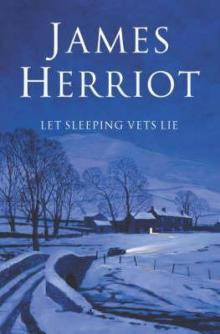 Let Sleeping Vets Lie
Let Sleeping Vets Lie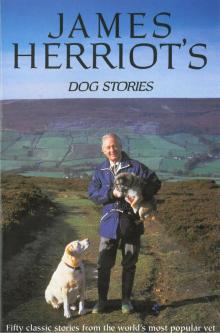 James Herriot's Dog Stories
James Herriot's Dog Stories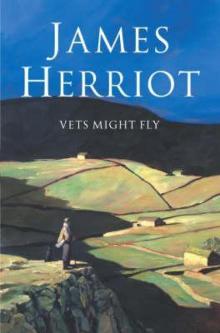 Vets Might Fly
Vets Might Fly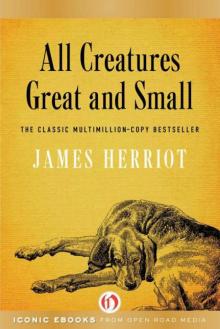 All Creatures Great and Small
All Creatures Great and Small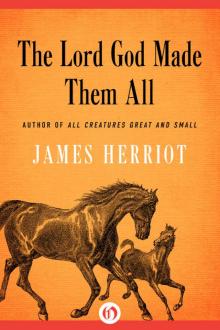 The Lord God Made Them All
The Lord God Made Them All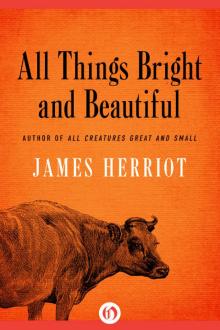 All Things Bright and Beautiful
All Things Bright and Beautiful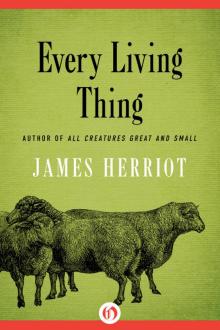 Every Living Thing
Every Living Thing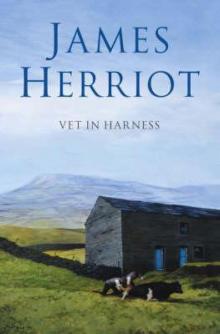 Vet in Harness
Vet in Harness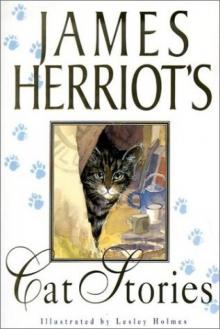 James Herriot's Cat Stories
James Herriot's Cat Stories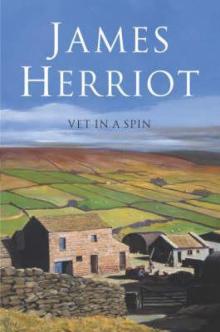 Vet in a Spin
Vet in a Spin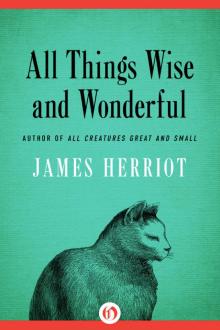 All Things Wise and Wonderful
All Things Wise and Wonderful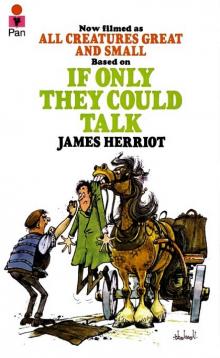 If Only They Could Talk
If Only They Could Talk